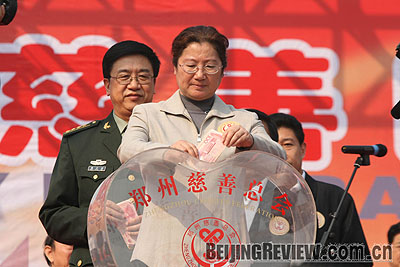| Numbers of the Week
100 billion yuan
The Ministry of Civil Affairs said mainland charity institutions had received a total of 100 billion yuan ($14.7 billion) in donations so far this year, the highest amount in history.
20 billion yuan
The government decided to spend 20 billion yuan ($2.9 billion) of the central budget on post-earthquake restoration and construction in 2009, in addition to the 63 billion yuan ($9.2 billion) it already has spent this year.

TO THE POINT: The central bank slashed the benchmark deposit and loan interest rate by 1.08 percentage points, three times higher than the previous 0.27-percentage-point cut, showing the government's determination to encourage economic development. The government also decided to offer more tax rebates for export-oriented light industries and remove quotas on cocoons and silk threads to boost exports. The Ministry of Finance injected 3 billion yuan ($440 million) into loss-making China Southern Airlines, while other airlines hoped for the same. The Ministry of Commerce proposed seven measures to encourage domestic consumption on seeing consumer confidence slip. The Industrial and Commercial Bank of China (ICBC) showed an interest in buying the assets of troubled U.S. insurer AIG, while China Life Insurance denied it was interested in purchasing them.
By LIU YUNYUN
Boldest Rate Cut
The People's Bank of China, the central bank, announced a significant rate cut package to help the country weather the global financial storm. The central bank slashed its benchmark one-year deposit and loan interest rates by a bold 1.08 percentage points on November 27. Analysts were surprised because they had expected only a 54-basis-point cut.
In the latest cuts, the one-year deposit interest rate was reduced to 2.52 percent from 3.6 percent, while the one-year loan interest rate was slashed to 5.58 percent from 6.66 percent.
This was the fourth time this year that the central bank had cut interest rates. Previously, it resorted to a mild 27-basis-point rate cut to finetune the country's economic development.
The central bank said the rate cuts were in line with the appropriately accommodative monetary policy announced in early November, and that they were supposed to "increase capital supply in the banking system, promote stable loan increases, and boost domestic economic development."
Real estate developers praised the latest cuts. Pan Shiyi, Chairman of Soho China, said it was big news for the real estate industry.
"At present, the property market is filled with a wait-and-see attitude," he was quoted as saying in a report on sina.com. "The rate cut will not only rescue potential buyers' confidence, but also greatly alleviate the property developers' pressure on repaying bank loans."
Furthermore, the central bank also announced it was lowering the reserve requirement ratio by 1 percentage point to 14 percent for large commercial banks, and by 2 percentage points to 13 percent for small lenders to increase capital supplies to fuel economic development.
But some business entrepreneurs questioned the effectiveness of the move. Liu Jingfang, President of Nantong Quanyong Electronic Industry Co. Ltd., told Beijing Review that at a time of global economic recession, banks have become more cautious about issuing loans for fear they will not get their money back if borrowers go under.
"Even though the central bank agreed to lend us more, commercial banks would still hesitate to let us borrow money from them," Liu said.
Boosting Exports
China's export levels have dropped considerably because of the government's previous credit tightening measures as well as sluggish international demand resulting from the global credit crunch. As a result, the government said it would adopt more measures to encourage exports by removing export quotas for certain products or increasing export tax rebates to rescue crumbling export-oriented companies.
The Ministry of Commerce said on November 20 that quotas on cocoons and certain silk thread products would be removed as of January 1. This year, the quota was 300 tons for cocoons and 26,000 tons for silk thread. The ministry also said related exporters would not need to apply for export quota licenses after the policy took effect.
Meanwhile, the State Council agreed on November 16 to further increase export tax rebates for light industry. The new policy will cover 3,770 items that account for 28 percent of the country's total exports.
| 